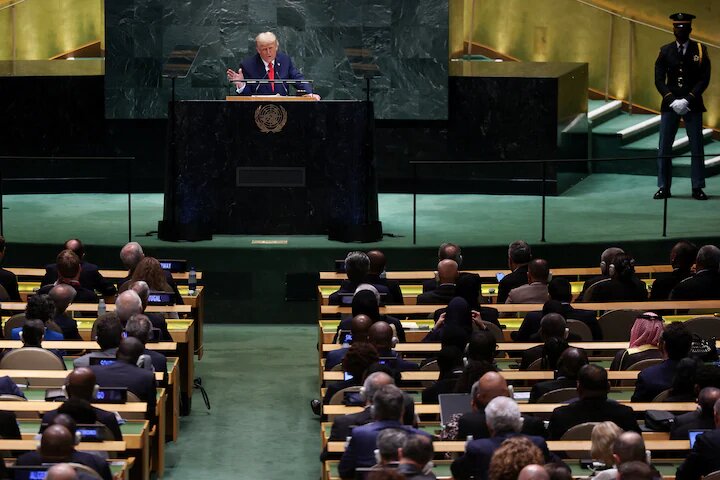How many lies did Trump tell about Iran in his speech at the UN General Assembly?

TEHRAN – The U.S. President Donald Trump’s speech at the United Nations General Assembly on Tuesday was less a diplomatic statement than a performance of falsehoods and distortions.
His remarks about Iran were riddled with inaccuracies, exaggerations, and outright fabrications, aimed at portraying the Islamic Republic as a menace while masking Washington’s own destructive record in West Asia.
Below are the three big lies Trump told about Iran during his Tuesday address at the UNGA:
1. Iran is a ‘sponsor of terror’
Trump repeated the worn-out American accusation that Iran is the “world’s number one sponsor of terror.” This claim has long been used in Washington to justify economic warfare, sanctions, and regional aggression.
Yet it ignores the reality that it is the United States that has fuelled instability across West Asia — from the invasion of Iraq and the destruction of Libya to arming Saudi Arabia in its brutal war on Yemen. By reviving this label before the world, Trump sought to shift attention away from America’s own role in spreading violence and extremism.
2. Washington wanted to ‘cooperate’ with Iran
Trump asserted that he had offered Iran “full cooperation” if it agreed to suspend its nuclear program. This statement is misleading. Iran’s nuclear activities are peaceful, legitimate, and monitored by the International Atomic Energy Agency (IAEA), which has repeatedly confirmed that Tehran has not pursued nuclear weapons.
More importantly, it was Trump himself who unilaterally abandoned the 2015 nuclear deal (JCPOA) — an agreement that already placed strict limits on Iran’s program. His so-called “offer” was not a genuine gesture of cooperation but an attempt to pressure Iran into surrendering its sovereign rights in exchange for vague promises from a government that had already violated its commitments.
Just days before Trump’s UNGA speech, the Security Council failed to adopt a resolution that would have blocked the reimposition of sanctions on Iran. The move followed Britain, France, and Germany’s activation of the so-called “snapback” mechanism, accusing Tehran of breaching the JCPOA.
Tehran dismissed the step as “illegitimate,” pointing out that the United States had already abandoned the nuclear accord in 2018. Iranian officials accused the European powers of aligning with Washington’s sanctions policy instead of fulfilling their own commitments under the deal. They stressed that Iran’s nuclear program remains peaceful, and any scaling back of commitments has been a direct response to Western non-compliance.
3. Iranians have no nuclear capabilities left
Trump falsely boasted that Iran’s nuclear enrichment capacity had been “demolished” under his watch. In reality, Iranian officials have repeatedly affirmed that, even after the 12 Day War, the country retains both the technical expertise and infrastructure to rapidly restore and expand its nuclear capabilities. Far from being demolished, Iran’s program has continued under international monitoring.
Trump’s UNGA speech was not a serious attempt at diplomacy but political theater aimed at intimidating Iran and impressing domestic audiences. By exaggerating threats and recycling baseless accusations, he tried to present himself as the only leader capable of confronting Iran. In reality, his “maximum pressure” campaign failed to achieve its objectives, isolated Washington internationally, and strengthened Iran’s determination to pursue its independent path.
